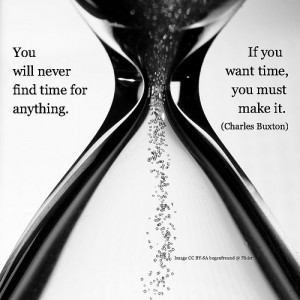Time for Writing
“The lies we tell ourselves about writing and time are all connected to envy, to the fairy tale notion that there are others whose lives are simpler, better funded, more conducive to writing than our own.
“The trick to finding writing time is to make writing time in the life you’ve already got. That’s where you’ve got leverage. Stop imagining some other life as a ‘real’ writer’s life.
“‘I used to maintain that I never had any time to write,” Laura remembers. ‘I wanted to write and I resented not writing but I also felt safe. It was threatening to make time for writing, but making the time has changed everything. I now not only have time to write but I seem to have time to do other things as well. Frankly, I think I was depressed and writing got rid of my depression.’
“Taking the time to write in our lives gives us the time of our lives. As we describe our environments, we begin to savor them. Even the most rushed and pell-mell life begins to take on the patina of being cherished.” – Julia Cameron, “The Time Lie,” The Right to Write
This morning for the first time in a week, I had to skip the prescribed “Morning Pages.” My husband’s car was in the

shop, and my dog needed to go to the vet, and that ate up the time I usually give myself before work. I felt a little resentful about it because I had thoughts that wanted to be written. In just a week’s time, it seems my psyche has come to expect this outlet. (I’ve been asking myself to remember my dreams so that I’d have something to write about first thing in the morning, and last night I had a vivid airplane dream. I have a fear of flying that is at odds with my love of traveling, and usually my airplane dreams are nightmares. In last night’s dream, nothing scary happened, which seems significant.)
What Laura says in the quote above really resonates with me, especially what she says about being safe and the fact that going after what you say you want is threatening. I have this problem more with submitting my work than with actually writing it, but the same principle applies. I feel resentful about not being published, but I keep pushing the steps that would take me toward publication away. It is threatening because each attempt to publish brings with it a (very high) risk of rejection. But the risk of doing nothing is probably higher if being published is something you want.
The most busy I’ve ever been in my life was the summer before I went to college, when I was working three jobs, all of which I disliked. It was not a happy summer. I typically worked from 11 am to 9 pm, six or seven days a week, so in those few hours in the morning, I would work on my novel. I can fall into the trap of thinking, “If I had more time, I would write X …”, but if I managed to write that summer, I should be able to write any time. I still arrange my life to try to get MORE writing in; I’m still never writing as much as I WANT to be writing, but the point is to at least BE writing.
Like Laura, I also see a connection between writing and mood. The worst part about the depression I lived through as a teenager was that it took away my desire to write, along with my desire to do anything else. I wrote anyway. I don’t know if it helped the depression, but it at least gave me something to hold onto, to remind me of who I was before the darkness. Now, I give myself “breaks” between big writing projects, looking forward to the luxury of not writing. Usually, I start to get irritable after a month or two.
Writing makes my life better. Writing makes me a better person. And doing it now, in these few minutes while I wait for my husband to pick me up for lunch, is taking the edge off missing the Morning Pages.